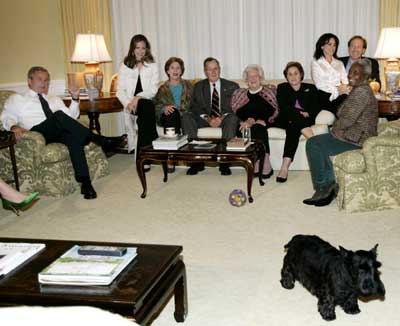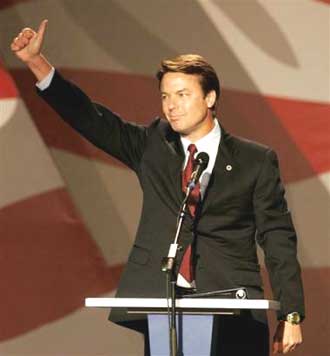|
Bush to declare re-election victory -- aides
(Agencies)
Updated: 2004-11-03 16:48
With Ohio looming as a Florida redux, President Bush prepared to declare re-election victory in the wee hours of Wednesday and Democratic rival John Kerry refused to concede.

Barney, pet terrier of the U.S. first family, walks away from a group picture of the Bush family including U.S. President George W. Bush (L) as they watch the election results of the 2004 presidential election in the West Sitting Hall of the White House residence November 2, 2004. Members of his family are (L-R) daughter Barbara Bush, first lady Laura Bush, father and former President George Bush, first lady Barbara Bush, sister Doro, sister-in-law Maria Bush, brother Neil and family friend Lois Betts. [Reuters] |
After winning Nevada and pulling within 16 electoral votes of the 270 required for a second term, Bush was laying claim to Ohio's 20 over Kerry's objections. "We will not base our decision on a concession," said Bush adviser Dan Bartlett.
Ceding nothing, Kerry dispatched running mate John Edwards to tell supporters in Boston: "We've waited four years for this victory. We can wait one more night."
The 92-word statement was an eerie echo of 2000 when advisers to both Bush and Democrat Al Gore told supporters that the race was too close to call — setting off a 36-day recount and a Supreme Court ruling that put Bush in office.
"We will fight for every vote," Edwards said, borrowing a line from Gore. Both campaigns considered sending political and legal teams to Ohio, already the scene of dueling lawsuits over provisional ballots.

Democratic vice presidential candidate Sen. John Edwards addresses supporters during the election night rally in Boston, Tuesday, Nov. 2, 2004. Edwards thanked supporters and announced that he and presidential candidate Sen. John Kerry would not concede. [AP] |
Inside the Bush campaign, an intense debate waged into the wee hours as some aides said parachuting teams into Ohio would ensure a political stalemate in a state Bush believes he has already won.
Bush, 58, won Florida this time with relative ease. Kerry took New Hampshire from Bush — the first and perhaps only state to switch parties — but it has just four electoral votes. That leaves Ohio as Kerry's only hope.
Bush's advisers told their boss he had won Ohio, but they nervously awaited confirmation.
The holdup was over provisional ballots — those cast by people whose qualifications to vote were challenged. At 3 a.m. EST, Bush had a lead of 125,000 votes; there were more provisional ballots outstanding.
"There's no mathematical path to victory for Kerry in Ohio," said Nicolle Devenish, spokeswoman for the Bush-Cheney campaign, arguing that Bush would get his share of the provisional ballots.
Nationwide, with 10 percent of the ballots still uncounted, 105 million people had voted — the same as in 2000.
Early in the voting, Kerry allowed himself to muse about the problems he might face in the White House, including a soaring deficit and a war that has claimed the lives of more than 1,100 U.S. soldiers.
"I'm not pretending to anybody that it's a bed of roses," said the 60-year-old Massachusetts senator.
The Electoral College count was excruciating: With 270 votes needed, Bush won 28 states for 254 votes. Kerry won 18 states plus the District of Columbia for 242 votes.
| Candidate |
Electoral |
States Won |
| Bush (R) |
254 |
28 |
| Kerry (D) |
252 |
20 |
With six states out, Kerry was still on the hunt for electoral votes that the GOP won four years ago. The states won by Democrat Al Gore in 2000 are worth just 260 votes this year due to redistricting — 10 short of the coveted number.
Kerry could pick that up plus some in Ohio with 20 electoral votes.
A 269-269 tie would throw the presidential race to the House.
Sen. Byron Dorgan, D-N.D.: "Obviously the presidential race is going to keep us up most of the night."
Republicans moved toward increasing their majority in the Senate, winning Democratic seats in Georgia, South Carolina, North Carolina and Louisiana while Democrats took GOP-held seats in Colorado and Illinois. State Sen. Barack Obama won easily in Illinois; in January, he will be the third black U.S. senator since Reconstruction.
Republicans extended their decade-long hold on the House for another two years, knocking off four veteran Texas Democrats.

Crystal Y'Barbo of Nacogodoches, Texas, front right, cheers as the crowd watches election returns early Wednesday, Nov. 3, 2004, at the Ronald Reagan Building and International Trade Center in Washington. [AP] |
Alongside the White House and congressional races, a full roster of propositions and local offices kept voters busy. But all eyes were focused on Kerry's bid to make Bush the first president voted out of office in the midst of a war.
"I've given it my all," Bush said after voting in a firehouse at Crawford, Texas, hoping to avoid being the first wartime president bounced from office.
Save Ohio, the race was a carbon copy of 2000, a narrowly fought battle waged by lawyers and politicians alike. In 2000, Bush lost the popular vote to Gore but won the Electoral College count and the presidency after a ruling by the Supreme Court gave him Florida.
The incumbent hoped to avoid the fate of his father — former President George H.W. Bush, who was ousted by voters in 1992 after waging war against Iraq and overseeing an ailing economy.
Legions of lawyers and election-rights activists watched for signs of voter fraud or disenfranchisement. New lawsuits sought clearer standards to evaluate provisional ballots in Ohio and a longer deadline to count absentee ballots in Florida.
While complaints were widespread, they weren't significant. "So far, it's no big, but lots of littles," said elections expert Doug Chapin.
Voters were torn over the presidential race, in ways all too familiar.
Exit polls suggested that slightly more voters trusted Bush to handle terrorism than Kerry. A majority said the country was safer from terrorism than four years ago, and they overwhelmingly backed Bush.
However, among those who said they were very worried about a terrorist strike, Kerry held a slight lead. A majority of voters said things were going poorly in Iraq, and they heavily favored Kerry.
With nearly 1 million jobs lost in Bush's term, Kerry was favored by eight of 10 voters who listed the economy as a top issue.
The nation's mood? There was division on that, too. Half said the country was headed in the right direction, a good sign for the incumbent.
Voters welcomed an end to the longest, most expensive presidential election on record. "It's the only way to make the ads stop," Amanda Karel, 25, said as she waited to vote at a banquet hall in Columbus, Ohio.
Both sides spent a combined $600 million on TV and radio ads, more than twice the total from 2000.
Bush won among white men, voters with family incomes above $100,000 and weekly churchgoers. Three-fourths of white voters who described themselves as born-again Christians or evangelicals supported Bush.
The president had hoped to increase his support among the religious right since 2000, but exit polls suggest there was little change.
Kerry retained Gore's margins among blacks and union households, key parts of the Democratic base. His voters named the economy and Iraq as top issues.
One in 10 voters were casting ballots for the first time and fewer than 10 percent were young voters, hardly the groundswell that experts had predicted. Kerry was favored by both groups, according to the surveys conducted for The Associated Press by Edison Media Research and Mitofsky International.
Poring over exit polls and field reports, Bush's aides in Arlington, Va., identified low-turnout precincts and dispatched more walkers to them. In Boston, advisers gave Kerry a longer-than-expected list of TV interviews to conduct by satellite to Wisconsin, Minnesota, Colorado, New Mexico, Nevada and Oregon.
Kerry's aides also tried to boost turnout in Hispanic areas by having the candidate's wife, Teresa Heinz Kerry, do Spanish-language television interviews. Exit polls showed the Democrat winning the Hispanic vote, but not by as much as Gore in 2000.
Voters in Wisconsin, Michigan and Ohio received a wave of last-minute telephone calls as Kerry's strategists sought to nail down victories in those key Midwest battlegrounds.
Bush won Alabama, Alaska, Arizona, Arkansas, Colorado, Florida, Georgia, Idaho, Indiana, Kansas, Kentucky, Louisiana, Mississippi, Missouri, Montana, Nebraska, Nevada, North Carolina, North Dakota, Oklahoma, South Carolina, South Dakota, Tennessee, Texas, Utah, Virginia, West Virginia and Wyoming.
Kerry won California, Connecticut, Delaware, the District of Columbia, Hawaii, Illinois, Maryland, Massachusetts, Michigan, Minnesota, New Hampshire, New Jersey, New York, Oregon, Pennsylvania, Rhode Island, Vermont, Washington and statewide in Maine.
Only nine of 34 Senate races on the ballot appeared competitive. One of them was held by Senate Minority Leader Tom Daschle, who was in a pitched fight against Republican John Thune.
All 435 House seats were up for election, but Democrats had little hope of a takeover. Republicans hold 227 seats, Democrats 205, with one Democratic-leaning independent and two vacancies in Republican-held seats.
Eleven gubernatorial contests were being decided Tuesday, along with 5,800 legislative seats in 44 states. Former Bush administration budget director Mitch Daniels won the governorship in Indiana, taking the seat from the Democrats.
Among the notable ballot measures, voters in 11 states approved propositions that would ban gay marriage. In California, voters approved spending $3 billion on stem-cell research.
The war on terror aside, there were fresh reminders of the election's stakes. Eighty-year-old Chief Justice William H. Rehnquist, cornerstone of a conservative Supreme Court, disclosed Monday he was undergoing radiation and chemotherapy for his thyroid cancer, a sign that he had a potentially grave form of the disease.
While neither candidate offered a specific exit strategy for Iraq, Kerry asserted that the election of a new president alone would persuade allies to take a greater share of the costs and sacrifices born by the United States.
The Democrats said he hoped to start withdrawing troops from Iraq in the first months of his presidency. Bush said such talk only encouraged terrorists.
The weapons of mass destruction Bush said were in Iraq were never found and more than 1,100 Americans have died in the conflict — 976 of them since he declared an end to combat operations May 1, 2003.
Kerry voted against the Persian Gulf War waged by Bush's father. He voted in favor of the 2002 resolution authorizing war in Iraq. On the stump, Bush called Kerry's a record of political expedience.
Bush blamed the Sept. 11 attacks for the sluggish economy and said his tax cuts put the nation on the road to recovery. Kerry noted that Bush was the first president in eight decades to end his term with net job losses.
Unabashedly conservative, Bush said he shared with voters the values of faith and family. Kerry said his faith and activities — hockey and hunting — put him in the mainstream, too.
|